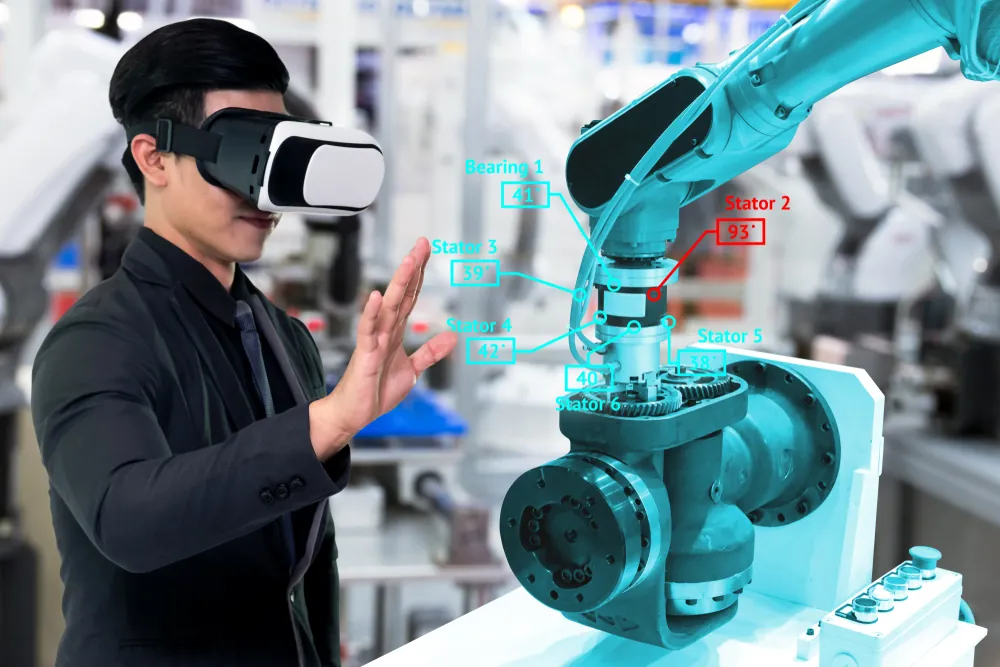
Virtual Reality Truck Driver Training Is the Real Deal
Discover how virtual reality (VR) is transforming truck driver training, offering realistic simulations tailored to each vehicle and scenario.
Virtual Reality Truck Driver Training is the real deal, and only a few things in the shipping industry are as critical as good truck driver training. Drivers must learn to handle any kind of situation they encounter, from ice storms to drunk drivers. The consequences of slow or unsuitable reactions can cost people their lives and carriers tens of thousands of dollars. Many types of training have been implemented over the years, with varying results. Now, virtual reality (VR) truck driver training is gaining traction, and with good reason.
Since 1992, truck drivers have been required to hold a commercial driver’s license (CDL). Commercial truck driver training schools throughout the country train prospective truck drivers through a combination of in-class and on-the-road training that usually lasts three-to-four weeks. The training prepares them to earn a Class A CDL.
This Class A CDL permits drivers to operate a combination of vehicles with a gross vehicle weight rating (GVWR) of more than 26,000 pounds, as long as the vehicles being towed have a GVWR of at least 10,000 pounds. The most common heavy-duty truck fitting that description is a tractor-trailer.
Standard in-class and closed-course training does a good job (depending on the school) of teaching the basics. It helps students get their license but cannot realistically replicate every circumstance a driver will face on the road. Another drawback with in-class training is that you can’t tell from the answers on a multiple-choice test whether the student knew the right answer or just guessed it. Virtual reality truck driver training overcomes these issues.
Carriers that hire new drivers — many only hire experienced drivers — tend to have in-house training programs as an alternative to the private CDL training schools. In other words, you could skip the private school training and get a job with a carrier to train you. Their programs also give recent graduates from private schools more real-world experience before they start carrying freight. Several carriers have been the early adopters of virtual reality truck driving training.
Thousands of businesses trust FreightCenter to move their freight faster, smarter, and cheaper! From unbeatable rates to top-notch service, our customers are raving about their shipping success.
See why they keep coming back!
Award-Winning Service, Trusted by Shippers Everywhere!
- 2021, 2017 & 2016 Food Logistics’ Top Green Providers
- 2021 & 2018 Supply & Demand Chain Executives’ Pros to Know: Matthew Brosious
- 2020 & 2019 Top Food Logistics’ 3PL & Cold Storage Provider Award
- 2020 & 2019 Business Observer’s Top 500 Companies on the Gulf Coast
- 2020 & 2017 SmartWay® Transport Partner
- 2020 & 2017 Food Logistics’ Champions: Rock Stars of the Supply Chain
- 2020 Best of Palm Harbor Awards for Local Businesses
- 2017 Green Supply Chain Award from Supply & Demand Chain Executive
- 2017 Tampa Bay Business Journal Heroes at Work
- 2016, 2015, & 2012 Food Logistics Top 100 Software and Technology Providers
- 2013 Tampa Bay Business 100 by Tampa Bay Business Journal
- 2013 Top 100 Great Supply Chain Partners by SupplyChainBrain
- 2012 TIA Samaritan Award Honorable Mention
- 2012, 2011 & 2010 TBBJ Fast 50 Recipient
- 2013, 2011, & 2010 Diversity Business Top Businesses

Why Choose FreightCenter?
Expertise in Freight Shipping: With over 25 years in the logistics industry, FreightCenter is dedicated to guiding you through the entire logistics process, from beginning to end. Our goal is to make freight shipping easy to understand and book. Don’t waste time researching and receiving quotes from individual carriers- FreightCenter’s got your back!
Competitive Rates with Tailored Solutions: We prioritize high-quality customer service without breaking your wallet. We utilize our relationships with regional and national carriers to offer you competitive, affordable rates while providing personalized solutions to your needs. Need a liftgate? We got you! Want to expedite your order? Leave it to us! We’re ready to provide tailored solutions that don’t compromise your freight shipment.
Personalized Customer Support: FreightCenter is committed to satisfying our customers. Our friendly customer support team is here to help you every step of the way, from initial inquiries to post-shipment concerns. We handle all aspects of logistics, including tracking, paperwork, and communication with carriers, so you can focus on your business while we manage your shipment. Choose us for our reliable service and affordable quotes!
Contact us today at FreightCenter.com or call today at 800.716.7608
How Virtual Reality Truck Driver Training Works
Drivers use a VR headset paired with a simulator that mimics the controls and environment of a real semi-truck. The system immerses them in lifelike scenarios, such as navigating highways, city streets, or icy mountain roads. Advanced software tracks their movements, allowing them to practice tasks like lane changes, braking, and maneuvering through tight spaces while receiving real-time feedback on their performance.

Key Feature
Customizable Scenarios:
VR allows trainers to tailor simulations to the company’s needs. Whether it’s practicing routes, hauling specific types of cargo, or preparing for emergencies, the environment can be adjusted to educate on many scenarios. VR enables drivers to experience and respond to potentially dangerous situations like jackknifing, low visibility, or sudden mechanical failures without real-world consequences. The software also provides detailed data on driver performance, identifying strengths and areas for improvement, which trainers can use to fine-tune instruction.
Applications Beyond Basic Training
- Refresher Courses for Experienced Drivers:
VR isn’t just for newcomers—it’s a great way for seasoned drivers to sharpen their skills or adapt to new technology and regulations. - Specialized Cargo Training:
Companies transporting unique or hazardous materials can create VR modules specific to their cargo’s needs. - Fleet-Wide Consistency:
VR ensures that all drivers in a company are trained to the same high standards, regardless of location or instructor availability.
Challenges to Consider
While VR is a game-changing technology, it requires an upfront investment in equipment and software. Additionally, it complements, rather than replaces, hands-on driving experience. The combination of VR and real-world practice is what delivers the best results.
Looking Ahead
As VR technology continues to evolve, it’s likely to become more accessible and advanced. Future innovations might include AI-driven adaptive training programs, multi-driver scenarios for convoy practice, or augmented reality overlays that blend real-world driving with virtual guidance.
VR is not just a trend; it’s becoming a staple in the trucking industry, offering safer, smarter, and more efficient ways to train drivers. Companies that adopt this technology now are setting themselves up for long-term success.
To create value for our customers by delivering customized shipping solutions that meet their unique needs and to fulfill shipping demands from simple to complex with expertise, guidance and ingenuity.
Rail shipping is a cost-effective and environmentally friendly transportation method that utilizes trains to move goods over long distances. It's known for its efficiency in handling large volumes of cargo, making it a sustainable and economical choice for businesses seeking reliable freight transport options.
Expedited shipping is a premium service designed to meet urgent delivery needs. It prioritizes speed and quick turnaround, ensuring that packages or goods reach their destination faster than standard shipping options. Expedited shipping is the go-to choice when time-sensitive deliveries are essential, providing businesses and individuals with reliable and prompt service for critical shipments.
White glove shipping is a premium service that goes beyond standard delivery, offering meticulous handling, specialized packaging, and in-home setup or installation for valuable or delicate items, ensuring a seamless and hassle-free experience for customers.
Less than truckload (LTL) shipping is a smart logistics solution for businesses with smaller shipments. It combines multiple smaller shipments into a single truckload, optimizing space and reducing costs. LTL shipping offers affordability and efficiency while ensuring timely delivery, making it an ideal choice for companies looking to save on transportation expenses without compromising on service quality.


Call FreightCenter today!
FreightCenter has you covered for all your freight and carrier needs! We’ll be there for you, from order to delivery, helping find the best deals and assisting however possible! Visit FreightCenter.com for more information, or call us at 800.716.7608
Q. Is VR training a substitute for on-the-road driving?
No, VR training complements traditional on-the-road driving, but certainly does not replace it. While it helps drivers build foundational skills and prepare for emergencies, hands-on experience in a real truck is still essential to complete a well-rounded training program.
Q. Is VR training effective for new AND experienced drivers?
Yes! VR training is beneficial to both groups. For new drivers, it can help build confidence and teach basic skills in a stress-free, risk-free environment. For experienced drivers, It can provide advanced training and help refresh skills, particularly for uncommon or high-risk scenarios.
Q. What are the costs of implementing Virtual Reality Truck Driver training?
While there is an initial investment in VR hardware, software, and setup, it can save money over time by reducing fuel costs, vehicle wear-and-tear, and insurance risks associated with traditional training methods.
Q. Can VR training be customized for specific needs?
Yes, VR systems are highly adaptable. Companies can create tailored scenarios based on their operations, such as specific routes, load types, or unique challenges their drivers may face.
Q. What tech is required for VR training?
VR training typically requires:
- A VR headset and controllers.
- A semi-truck simulator with realistic controls (steering wheel, pedals, etc.).
- Software that creates driving scenarios and tracks performance.


